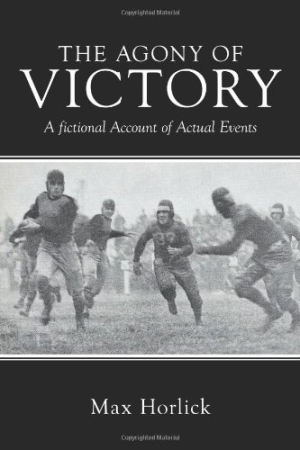The Agony of Victory
A Fictional Acount of Actual Events
Horlick captures the rhythms of small-town college life through well-developed characters and a refreshing plot.
The Agony of Victory takes a historical occurrence—Rutgers University’s undefeated football season—and portrays a fictional version using a tried-and-true cinematic technique: beginning in the present and going back in time. After a young reporter arrives at the home of legendary retired football coach Eddy Gordon, the narrative is moved along with “yellowed clippings” taken from a variety of local and national newspapers. This book is an engaging read of speculative history, the backstory of an undefeated college football season.
In the late 1930s, Gordon, a successful football coach from a local high school, is hired provisionally while Lagoda College searches for a replacement for Coach Tzoriss, whose teams were winless the previous two seasons. Gordon learns of the inflexibility of a university and the predictability of “normal” percentage curves. He notes with humor, “A given percentage would lose virginity, and none would regain it.”
Author Max Horlick catches the rhythms of small-town college life, capturing celebratory bonfires and the progression of the semester. The author also has an ear for dialogue. Gus owns the Corner Greek’s restaurant and says to his daughter, “Athena, take da cutch to da bag room. You meal on howze.” Nature is used often to set the scene. Lines like “autumn breezes gently rustled the leaves of the old elms” evoke the changing seasons in New England.
While training and learning the personalities of his new team, Gordon’s insights into human nature show him to be more than a high school jock. His background in ancient Greek history and the classics gives him insights into the team; citing the plight of Sisyphus wins him an immediate friendship with Gus. Newspaper clips written in various styles report on each game and reflect the news writers’ opinions—a device that moves the narration. The introduction of several possible love interests lead to speculation of who will capture Gordon’s heart; to the author’s credit, it is revealed on the last page.
Local sports columnist Art Moorehouse is Gordon’s nemesis from the beginning with claims of evasive answers. Gordon answers throughout the book, “in the end all will be told.” Moorehouse continues his criticism and negative view, even accusing Gordon of holding his team back; Moorehouse also hints at gambling. These claims bring about a series of appearances before the Athletic Council that question Gordon’s actions, but he bests them at every meeting.
The character’s names are almost a toss-off: Dean Kvetch (Yiddish for perpetual whiner), Tzoriss (Yiddish for trouble and suffering), Outhouse, and Bookbinder (for the librarian) are at odds with the personality and personal traits these characters develop during the semester.
The story’s pacing flows from game to game and will hold the interest of non-football fans, yet it fumbles with open quotation marks, typos, stray punctuation, and letters that distract from the refreshing plot twists. Despite these defects, The Agony of Victory is an engaging story.
Reviewed by
Mark Laiosa
Disclosure: This article is not an endorsement, but a review. The publisher of this book provided free copies of the book and paid a small fee to have their book reviewed by a professional reviewer. Foreword Reviews and Clarion Reviews make no guarantee that the publisher will receive a positive review. Foreword Magazine, Inc. is disclosing this in accordance with the Federal Trade Commission’s 16 CFR, Part 255.

